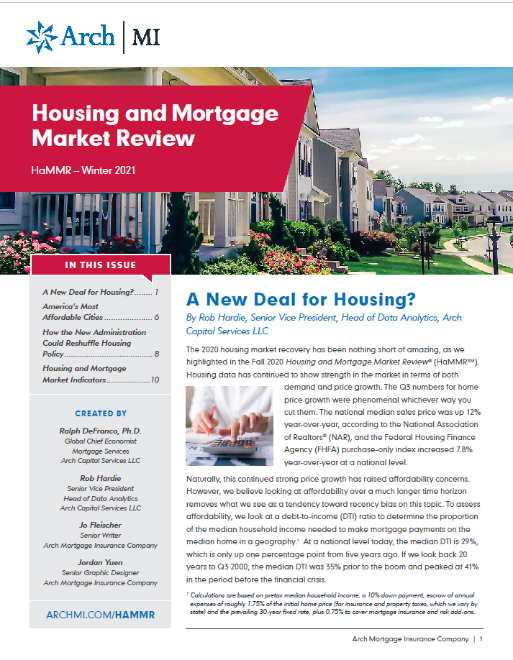
1,348 words. Six-minute read.
A tumultuous January on top of a turbulent 2020 begs for a new start.
Hopefully, that begins today when Joe Biden is sworn in as the nation’s 46th president under his inaugural-themed banner, “America United.”
- Members of the nation’s 117th Congress — including 59 freshman representatives and six new senators — began their terms on Jan. 3. When two new senators from Georgia and one from California assume office later today, Democrats will control the Legislative and Executive branches for the first time since 2011.
- The changes include new chairmen for both the Senate Banking, Housing and Urban Affairs Committee (Sherrod Brown, D-OH) and the Housing Subcommittee of the House Financial Services Committee (Rep. Emanuel Cleaver, D-MO).
It figures to be a fascinating year in political — and housing — affairs.
Arch MI’s Capital Commentary aims to guide our readers through the maze of housing policy issues with insight, brevity and occasional levity, too. (Including our new Capital Commentary Contest. See item #5.)
1. One More Thing Before We Go
While unsuccessful in exiting Fannie Mae and Freddie Mac (GSEs) from 12 years of conservatorship during its four years in power, the Trump administration did make last-minute changes to the GSEs’ regulatory regime that enables them to accumulate more capital while constricting the risks they can take.
- Why it matters: Until September 2019, the GSEs had to send nearly all of their earnings to the U.S. Treasury to compensate the government for the capital it made available to Fannie and Freddie in response to the 2008 financial crisis. Under the amendments to the agreement between the Treasury Department and the FHFA, they can now retain their earnings and strengthen their capital positions.
FHFA’s final capital rule requires the GSEs to hold a cumulative $283.4 billion in risk-based capital. A majority of that will likely have to be raised by third-party investors, but a significant share will be generated organically from GSE earnings.
- “The Trump administration has set a path for releasing Fannie Mae and Freddie Mac from government control, but President-elect Joe Biden gets to decide whether to take it,” wrote Bloomberg’s Joe Light (subscription required).
- The contract changes “provide that there will be no exit until all material litigation relating to conservatorship is resolved … and the GSE has common equity of at least 3% of its assets,” according to Treasury Secretary Steven Mnuchin.
The amended contract between Treasury and the GSEs also codified some restrictions to operations already ongoing and added some new ones to prevent the GSEs from increasing the credit risk that they hold:
- Volume discounts for large lenders are banned. FHFA Director Mark Calabria already prohibited the practice; the agreement codifies it.
- High-risk loans are limited. For instance, a maximum of 6% of purchase-money loans can have two or more of these characteristics at origination: A combined loan-to-value ratio greater than 90%; debt-to-income ratio greater than 45%; and a credit score less than 680.
- GSE purchases of loans secured by second homes and investment properties are capped.
2. GOP Applauds Plan, Dems Criticize It
Leading Republicans on the committees with jurisdiction for the GSEs, Rep. Patrick McHenry, R-NC, and Sen. Pat Toomey, R-PA, lauded the agreement, as evidenced by this Tweet:

On the other hand, criticism from top Democrats on the same committees was harsh.
- S. Rep. Maxine Waters, D-CA, and Chair of the House Financial Services Committee, said “it is simply unacceptable … to make major changes to the housing finance system which … could lock families out of homeownership” (in the final days of the Trump administration). She later asked Biden to rescind all “midnight rulemaking” by the Trump administration.
- Brown had a similar response. “At the 11th hour, the Trump administration has decided it’s time to jam through changes to the GSEs and leave it to President-elect Biden to deal with the consequences.”
3. I Won’t Forget Housing, Pledges Brown
Claiming housing issues were too often overlooked when Republicans ran the Senate Banking, Housing and Urban Affairs Committee, the incoming Democratic Chairman pledged that things will change.
The upshot: “Housing determines so much in people’s lives. It determines closeness to a grocery store … the school district your children live in,” Brown said at a news conference to review his priorities for the 117th Congress, as reported by National Mortgage News (subscription required).
- “You will always hear me call it, ‘Banking and Housing,’” Brown said of the committee he will lead. “Housing was a word left out of this committee’s title for far too many years and it won’t be left out anymore.” (New York Times)
- Brown also said the committee will view many of its policies through a “racial justice lens.”
Keeping people in their homes will be the first order of business and that starts with additional funding to help households impacted by the COVID-19 virus, he said.
- “The first thing in this committee will be what we do to prevent evictions in the middle of the pandemic in the middle of the winter.” (American Banker, subscription required.)
- Another focus for Brown will be the Consumer Financial Protection Bureau (CFPB). He told reporters that he expects CFPB Director Kathy Kraninger to resign by Jan. 20 or be fired by the incoming Biden administration.
4. Hoosier Choice for Most Affordable City?
More Americans than ever are working from home, meaning there’s never been as much freedom to move to vibrant cities with both burgeoning economies and affordable homes.
- So where should you consider relocating? That’s the task Rob Hardie, Senior Vice President of Data Analytics, Arch Capital Services Inc., undertook to save you some researching time when he prepared the latest edition of Arch’s Housing and Mortgage Market Review® (HaMMRSM). Click the graphic to download the full report.
Hardie studied cities with a population of at least 1 million; both population and employment growth exceeding the national averages; and where less than 25% of the median household income is needed to cover the monthly mortgage payments on a median-priced home.
- Indianapolis, Indiana, placed first. Its average debt-to-income ratio is just 21%, but you might want to move there quickly to take advantage of the affordability. Housing prices soared 14% in 2020 and, with less than one month’s inventory for sale, expect more appreciation this year.
- Three of the top five are in the South. Atlanta, Georgia; Raleigh, North Carolina; and Nashville, Tennessee, placed Nos. 2, 3 and 5 on the HaMMR list with Columbus, Ohio earning fourth place.
5. Capital Commentary Contest
Today, we celebrate an inaugural event of our own: the first Capital Commentary Contest as a way of interacting with our readers.

- In each edition, we will post a quiz. All readers emailing the correct answer by the deadline will be entered into a random drawing to win the handsome Capital Commentary/PolicyCast mug and saucer pictured here. It would look great on your desk or breakfast table.
- Two readers with the right answer will win bi-weekly: One from within Arch MI, and a second from our external readership.
Contest No. 1: A President’s Best Friend

Former President Harry Truman is alleged to have said, “If you want a friend in Washington, get a dog.”
If that’s the case, I’ve got at least two: My golden retrievers Lulu (left in photo) and Charley. A lot of commanders in chief agree with Truman. Thirty of our 45 presidents welcomed dogs to the White House, and the Biden family will be joined by their German shepherds, Champ and Major.
- Take the Quiz: President Richard Nixon had three dogs during his two terms in the White House — an Irish setter named King Timahoe, a poodle named Vicki and a terrier named Pasha. But he is better remembered for talking about the dog he had 16 years before being elected president. What was that dog’s name?
Email your answer with the subject line “Capital Commentary Contest” to [email protected] by 11:59 p.m. EST Friday, Jan. 22 for a chance to win an Arch MI Capital Commentary/PolicyCast mug. We’d also appreciate your feedback on how we’re doing. Please use the same email address for those responses.

Do you think Capital Commentary offers valuable information on housing policy and its potential impacts? If you do, share your comments with us. Your feedback will help ensure Capital Commentary covers the stories that have the most impact on your business.

About Arch MI’s Capital Commentary
Capital Commentary newsletter reports on the public policy issues shaping the housing industry’s future. Each issue presents insights from a team led by Kirk Willison.
About Arch MI’s PolicyCast
PolicyCast — a video podcast series hosted by Kirk Willison — enables mortgage professionals to keep on top of the issues shaping the future of housing and the new policy initiatives under consideration in Washington, D.C., the state capitals and the financial markets.
Stay Updated
Sign up to receive notifications of new Arch MI PolicyCast videos and Capital Commentary newsletters.
